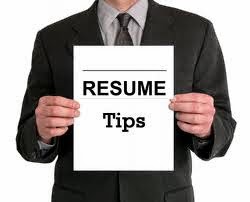Resume Tips
Curriculum Vitae:
an outline of a person's educational and professional history, usually
prepared for job applications (L, lit.: the course of one's life).
A CV is the most flexible and convenient way to make applications. It can convey your personal details in the way that presents you in the best possible light and can be used to make multiple applications to employers in a specific career area.
A CV is the most flexible and convenient way to make applications. It can convey your personal details in the way that presents you in the best possible light and can be used to make multiple applications to employers in a specific career area.
Information should a CV include?
 Personal details
Personal detailsNormally these would be your name, address, date of birth (although with age discrimination laws now in force this isn't essential), telephone number and email.
Education and qualifications
Your degree subject and university, plus A levels and GCSEs or equivalents. Mention grades unless poor!
Work experience
* Use action words such as developed, planned and organized
* Even work in a shop, bar or restaurant will involve working in a team, providing a quality service to customers, and dealing tactful with complaints. Don't mention the routine, non-people tasks (cleaning the tables) unless you are applying for a casual summer job in a restaurant or similar.
* Try to relate the skills to the job. A finance job will involve numeracy, analytical and problem solving skills so focus on these whereas for a marketing role you would place a bit more more emphasis on persuading and negotiating skills.
Interests and achievements
* Keep this section short and to the point.
* Bullets can be used to separate interests into different types: sporting, creative etc.
* Don't use the old boring cliches here: "socialising with friends".
* Don't put too many passive, solitary hobbies (reading, watching TV, stamp collecting) or you may be perceived as lacking people skills.
* Show a range of interests to avoid coming across as narrow : if everything centres around sport they may wonder if you could hold a conversation with a client who wasn't interested in sport.
* Hobbies that are a little out of the ordinary can help you to stand out from the crowd: skydiving or mountaineering can show a sense of wanting to stretch yourself and an ability to rely on yourself in demanding situations
* Any interests relevant to the job are worth mentioning: current affairs if you wish to be a journalist, a fantasy share portfolio such as Bullbearings if you want to work in finance.
* Any evidence of leadership is important to mention: captain or coach of a sports team, course representative, chair of a student society, scout leader.
* Anything showing evidence of employability skills such as teamworking, organising, planning, persuading, negotiating etc.
Skills
* The usual ones to mention are languages (good conversational French, basic Spanish), computing (e.g. "good working knowledge of MS Access and Excel, plus basic web page design skills" and driving ("full current clean driving licence").
* If you are a mature candidate or have lots of relevant skills to offer, a skills-based CV may work for you
Referees
* Normally two referees are sufficient: one academic (perhaps your tutor or a project supervisor) and one from an employer (perhaps your last part-time or summer job). See our page on Choosing and Using Referees for more help with this.


No comments:
Post a Comment